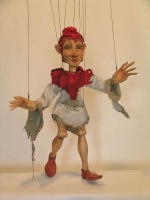Difference between revisions of "Puppet"
m (Text replacement - "http://" to "https://") |
|||
| (One intermediate revision by the same user not shown) | |||
| Line 2: | Line 2: | ||
==Origin== | ==Origin== | ||
| − | [ | + | [https://nordan.daynal.org/wiki/index.php?title=English#ca._1100-1500_.09THE_MIDDLE_ENGLISH_PERIOD Middle English] ''popet'' [[youth]], doll, from Middle French ''poupette'', diminutive of ''poupe'' doll, from Vulgar Latin ''puppa'', alteration of Latin ''pupa'' |
| − | *[ | + | *[https://en.wikipedia.org/wiki/16th_century 1538] |
==Definitions== | ==Definitions== | ||
*1a : a small-scale figure (as of a [[person]] or animal) usually with a cloth [[body]] and hollow head that fits over and is moved by the hand | *1a : a small-scale figure (as of a [[person]] or animal) usually with a cloth [[body]] and hollow head that fits over and is moved by the hand | ||
| Line 12: | Line 12: | ||
A '''puppet''' is an inanimate object or [[representation]]al figure animated or [[manipulated]] by an entertainer, who is called a puppeteer. It is used in puppetry, a play or a presentation that is a very [[ancient]] form of [[theatre]]. | A '''puppet''' is an inanimate object or [[representation]]al figure animated or [[manipulated]] by an entertainer, who is called a puppeteer. It is used in puppetry, a play or a presentation that is a very [[ancient]] form of [[theatre]]. | ||
| − | There are many [[different]] varieties of puppets, and they are made of a wide range of [[materials]], depending on their form and intended use. They can be [[extremely]] [[complex]] or very [[simple]] in their construction. They may even be found objects. As [ | + | There are many [[different]] varieties of puppets, and they are made of a wide range of [[materials]], depending on their form and intended use. They can be [[extremely]] [[complex]] or very [[simple]] in their construction. They may even be found objects. As [https://en.wikipedia.org/wiki/Oscar_Wilde Oscar Wilde] wrote, "There are many [[advantages]] in puppets. They never [[argue]]. They have no crude views about art. They have no private lives". |
| − | The word puppet can mean a [[political]] [[leader]] installed, supported and controlled by more powerful [[forces]], without legitimacy in the country itself. In [[modern]] times, this usually implies no democratic [[mandate]] from the country's electorate; in earlier times, it could have meant a [[monarch]] imposed from outside, who was not a member of a country's established ruling [[dynasty]], and/or unrecognised by its [[nobility]]. "Puppet government", "puppet regime" and "puppet state" are derogatory terms for a [[government]] which is in charge of a region or country, but only through being installed, [[supported]] and controlled by a more powerful outside government (see [ | + | The word puppet can mean a [[political]] [[leader]] installed, supported and controlled by more powerful [[forces]], without legitimacy in the country itself. In [[modern]] times, this usually implies no democratic [[mandate]] from the country's electorate; in earlier times, it could have meant a [[monarch]] imposed from outside, who was not a member of a country's established ruling [[dynasty]], and/or unrecognised by its [[nobility]]. "Puppet government", "puppet regime" and "puppet state" are derogatory terms for a [[government]] which is in charge of a region or country, but only through being installed, [[supported]] and controlled by a more powerful outside government (see [https://en.wikipedia.org/wiki/Quisling Quisling]).[https://en.wikipedia.org/wiki/Puppet] |
[[Category: The Arts]] | [[Category: The Arts]] | ||
[[Category: Political Science]] | [[Category: Political Science]] | ||
Latest revision as of 02:37, 13 December 2020
Origin
Middle English popet youth, doll, from Middle French poupette, diminutive of poupe doll, from Vulgar Latin puppa, alteration of Latin pupa
Definitions
- 1a : a small-scale figure (as of a person or animal) usually with a cloth body and hollow head that fits over and is moved by the hand
- b : marionette
Description
A puppet is an inanimate object or representational figure animated or manipulated by an entertainer, who is called a puppeteer. It is used in puppetry, a play or a presentation that is a very ancient form of theatre.
There are many different varieties of puppets, and they are made of a wide range of materials, depending on their form and intended use. They can be extremely complex or very simple in their construction. They may even be found objects. As Oscar Wilde wrote, "There are many advantages in puppets. They never argue. They have no crude views about art. They have no private lives".
The word puppet can mean a political leader installed, supported and controlled by more powerful forces, without legitimacy in the country itself. In modern times, this usually implies no democratic mandate from the country's electorate; in earlier times, it could have meant a monarch imposed from outside, who was not a member of a country's established ruling dynasty, and/or unrecognised by its nobility. "Puppet government", "puppet regime" and "puppet state" are derogatory terms for a government which is in charge of a region or country, but only through being installed, supported and controlled by a more powerful outside government (see Quisling).[1]
